|
|
|
Sort Order |
|
|
|
Items / Page
|
|
|
|
|
|
|
| Srl | Item |
| 1 |
ID:
053863


|
|
|
|
|
| Publication |
Harlow, Longman, 2001.
|
| Description |
x, 158p.
|
| Standard Number |
058230377X
|
|
|
|
|
|
|
|
|
|
|
|
Copies: C:1/I:0,R:0,Q:0
Circulation
| Accession# | Call# | Current Location | Status | Policy | Location |
| 044724 | 044724/CRO 044724 | Main | On Shelf | General | |
|
|
|
|
| 2 |
ID:
079715


|
|
|
|
|
| Publication |
2007.
|
| Summary/Abstract |
The 'London elite' that constructs British discourses on terror and
threat have moved from underplaying the threat of terrorism to the
United Kingdom (UK) to overplaying it (in terms of how public rhetoric
relates to threat perceptions). This for three reasons: a view that the British
public are more resilient in the face of terror than was first thought, and an
assessment that more pressure must be put onto 'British Muslim' communities
to prevent radicalisation; a growing sense that there is something
'wrong' with Islam itself, and not just with the extremists; and a perceived
need to be more robust in talking about threats as authority has declined,
in part due to the occupation in Iraq. The danger is that these moves could
themselves create deeper social divisions. In addition, these debates have
affected and been affected by debates on Britishness. Far from seeing the
perpetrators of terrorist acts and plans in the UK as being inherently
foreign in motivation, this paper seeks to situate them in their British
context.
|
|
|
|
|
|
|
|
|
|
|
|
|
|
|
|
| 3 |
ID:
114820
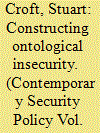

|
|
|
|
|
| Publication |
2012.
|
| Summary/Abstract |
The development of ontological security studies, for example by Mitzen, Steele, and Berenskoetter and Giegerich, has been an important innovation in the field. However, by focusing on the level of the state rather than that of the individual, this new tradition is somewhat different from the intellectual origins of ontological security in sociology and psychology. Drawing on those disciplines, I argue that the key focus should be on the understandings of individuals about their own security, intersubjectively constructed. Ontological security can be understood in terms of the need to construct biographical continuity, to construct a web of trust relations, to act in accordance with self-integrity, and to struggle against ontological insecurity, or dread, in Kierkegaard's sense. I then take and apply this framework to understand the process by which British Muslims have become insecuritized (understood as a term through which dominant power can decide who should be protected and who should be designated as those to be controlled, objectified, and feared) in the period since 9/11.
|
|
|
|
|
|
|
|
|
|
|
|
|
|
|
|
| 4 |
ID:
047426
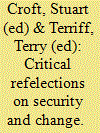

|
|
|
|
|
| Publication |
London, Frank Cass, 2000.
|
| Description |
xvi, 255p.
|
| Standard Number |
0714649937
|
|
|
|
|
|
|
|
|
|
|
|
Copies: C:1/I:0,R:0,Q:0
Circulation
| Accession# | Call# | Current Location | Status | Policy | Location |
| 043326 | 327.116/CRO 043326 | Main | On Shelf | General | |
|
|
|
|
| 5 |
ID:
076240
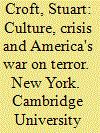

|
|
|
|
|
| Publication |
New York, Cambridge University Press, 2006.
|
| Description |
vii, 301p.
|
| Standard Number |
0521867991
|
|
|
|
|
|
|
|
|
|
|
|
Copies: C:1/I:0,R:0,Q:0
Circulation
| Accession# | Call# | Current Location | Status | Policy | Location |
| 052330 | 363.3251/CRO 052330 | Main | On Shelf | General | |
|
|
|
|
| 6 |
ID:
005055


|
|
|
|
|
| Publication |
Aldershot, Dartmouth Publication, 1994.
|
| Description |
vii,225p.
|
| Standard Number |
1855214490
|
|
|
|
|
|
|
|
|
|
|
|
Copies: C:1/I:0,R:0,Q:0
Circulation
| Accession# | Call# | Current Location | Status | Policy | Location |
| 036228 | 327.41/CRO 036228 | Main | On Shelf | General | |
|
|
|
|
| 7 |
ID:
101005
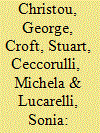

|
|
|
|
|
| Publication |
2010.
|
| Summary/Abstract |
The central aim of this article is to discuss the question of how we can understand and explain the European Union (EU) as a security actor - in essence, to elaborate on the current literature on security governance in order to provide a more theoretically driven analysis of the EU in security. Our contention is that whilst the current literature on security governance in Europe is conceptually rich, there still remains somewhat of a gap between those that do 'security governance' and those that focus on 'security' per se. We argue that a synergy or at least a conversation between these two literatures is required in order to enrich further the study of the EU as global-regional security actor.
|
|
|
|
|
|
|
|
|
|
|
|
|
|
|
|
| 8 |
ID:
105361
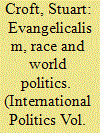

|
|
|
|
|
| Publication |
2011.
|
| Summary/Abstract |
American identities have traditionally been bound up with racial and religious markers - the WASP marker being for many, many decades and that which described the fullest state of American-ness. In the age of an African-American President, such conventional wisdoms are clearly challenged; and yet race and religion still describe different degrees of American-ness. This article investigates these identity themes not through the traditional duologue of white and African American, but seeks to understand in different communities how race and religion combine to produce different American-ness. Through an examination of two communities deemed problematic because of the high percentage of unchurched among them - First Peoples and Asian Americans - the article describes different processes at work. First Peoples are often seen in racial rather than national terms. The work of evangelicals 'among' such peoples is assessed within the United States and beyond. In contrast, Asian-American identities are often articulated through evangelism, particularly on the campuses of the United States. Together, these case studies show that American-ness is being redefined, to include new racial categories and groups newly empowered by their religious activity. This connects to issues of migration; evangelism is now active in America as well as beyond, as the world comes to live in the United States, traditional boundaries - inside/outside and white/African American - carry different and often less weight than hitherto has been the case.
|
|
|
|
|
|
|
|
|
|
|
|
|
|
|
|
| 9 |
ID:
096751
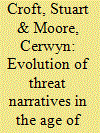

|
|
|
|
|
| Publication |
2010.
|
| Summary/Abstract |
This article examines the evolution of threat narratives in the age of terror, focusing on the United Kingdom. The analysis is broken down into two sections. The first part of the article presents four distinct and yet overlapping notions of the threats which have influenced both the West, and more specifically the UK, in debates about counterterrorism since 9/11. The four threat narratives-Al-Qaeda as a central organization; decentralized terror networks; home grown; and finally apocalyptic threats-have all been used to inform counter terror measures in the West. The second section of the article argues that terrorism has evolved strategically, and is hybridized owing to the security environment-interpenetrated by globalization, digital media and information communication technologies-in which it occurs. The article concludes with a preliminary discussion of some strategic and operational themes which have influenced the form and character of terrorism and insurgency, exploring how they impact on the ways in which threats are constituted and countered, illustrating that what is new maybe the nature of our own fears.
|
|
|
|
|
|
|
|
|
|
|
|
|
|
|
|
| 10 |
ID:
151176


|
|
|
|
|
| Summary/Abstract |
The performance of International Relations (IR) scholarship – as in all scholarship – acts to close and police the boundaries of the discipline in ways that reflect power–knowledge relations. This has led to the development of two strands of work in ontological security studies in IR, which divide on questions of ontological choice and the nature of the deployment of the concept of dread. Neither strand is intellectually superior to the other and both are internally heterogeneous. That there are two strands, however, is the product of the performance of IR scholarship, and the two strands themselves perform distinct roles. One allows ontological security studies to engage with the ‘mainstream’ in IR; the other allows ‘international’ elements of ontological security to engage with the social sciences more generally. Ironically, both can be read as symptoms of the discipline’s issues with its own ontological (in)security. We reflect on these intellectual dynamics and their implications and prompt a new departure by connecting ontological security studies in IR with the emerging interdisciplinary fields of the ‘vernacular’ and ‘everyday’ via the mutual interest in biographical narratives of the self and the work that they do politically.
|
|
|
|
|
|
|
|
|
|
|
|
|
|
|
|
| 11 |
ID:
052235
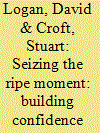

|
|
|
| 12 |
ID:
066024
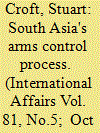

|
|
|
| 13 |
ID:
082133


|
|
|
|
|
| Publication |
2008.
|
| Summary/Abstract |
America's evangelical community are usually seen to be little more than cheerleaders for the Bush administration's activist foreign policy. However, there is much going on in this diverse community, which has begun to develop its own ideas about foreign policy, many of which contradict realist and neo-conservative approaches. Tracing the development of the community's interest in foreign affairs, the article focuses on the three most important contemporary issues for America's conservative Protestants (CPs): solidarity with the oppressed; concern over and use of international institutions (and with Europe); and support for Israel. There is a growing coherence among America's (white) CPs, which will be of increasing relevance to America's partners and friends
|
|
|
|
|
|
|
|
|
|
|
|
|
|
|
|
|
|
|
|
|